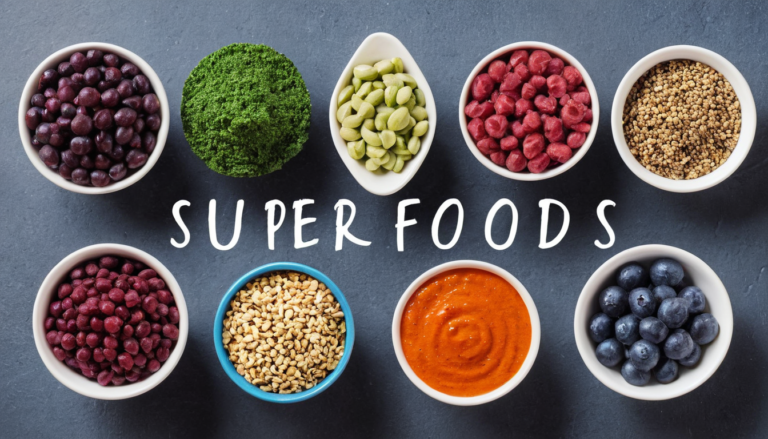In an age where health and nutrition have become paramount, the term “superfood” has gained significant attention. But what exactly are superfoods? What makes them so special, and why should you consider incorporating them into your diet? This article will delve into the concept of superfoods, explore their benefits, and provide practical guidance on how to include them in your meals.
What Are Superfoods?
Superfoods are nutrient-rich foods considered to be especially beneficial for health and well-being. While there is no scientific definition for superfoods, they generally refer to foods that are packed with vitamins, minerals, antioxidants, and other compounds that can contribute to various aspects of health. These foods often boast low calories while being rich in essential nutrients.
Superfoods can come from a variety of sources, including fruits, vegetables, nuts, seeds, legumes, grains, and even certain fish. Some of the most recognized superfoods include:
- Blueberries
- Salmon
- Quinoa
- Spinach
- Chia seeds
- Green tea
- Avocado
The Benefits of Superfoods
Superfoods offer numerous health benefits largely due to their rich nutrient content. Here are some key advantages of incorporating superfoods into your diet:
1. Nutrient Density
Superfoods are usually high in vitamins, minerals, and antioxidants while being low in calories. This means you can obtain essential nutrients without the added sugar and unhealthy fats found in processed foods.
2. Antioxidant Properties
Many superfoods are rich in antioxidants, which help combat oxidative stress in the body. Antioxidants neutralize free radicals, thus reducing inflammation and lowering the risk of chronic diseases such as heart disease, cancer, and diabetes.
3. Improved Heart Health
Foods like fatty fish (e.g., salmon) and nuts (e.g., walnuts) provide omega-3 fatty acids, which are known to improve heart health. Consuming these superfoods can help lower bad cholesterol levels and reduce blood pressure.
4. Better Digestive Health
Many superfoods, especially fruits, vegetables, and whole grains, are high in fiber, which is essential for good digestion. A fiber-rich diet promotes healthy gut bacteria and helps prevent digestive disorders.
5. Enhanced Immune Function
With their abundant vitamins and minerals, particularly vitamin C and zinc, several superfoods can bolster the immune system. Foods like citrus fruits, berries, and green leafy vegetables contribute to improved immune responses.
Incorporating Superfoods into Your Diet
Adding superfoods to your diet doesn’t have to be complicated. Here are several practical tips to help you incorporate these nutritional powerhouses into your meals:
1. Start with Breakfast
Swap out that sugary cereal for overnight oats topped with chia seeds and fresh berries. Chia seeds are a great source of omega-3 fatty acids, while berries provide antioxidants, making for a deliciously nutritious breakfast.
2. Snack Smart
Consider healthier snacks like a handful of walnuts, baby carrots with hummus, or apple slices with almond butter. These snacks are not only filling but also bursting with nutrients.
3. Add Greens to Your Meals
Incorporate a variety of greens, such as spinach or kale, into salads, smoothies, or wraps. These leafy greens are packed with vitamins A, C, and K, which are vital for overall health.
4. Experiment with Grains
Try substituting regular rice or pasta with quinoa or whole grain versions. Quinoa is a complete protein, meaning it contains all the essential amino acids, making it an excellent addition to any meal.
5. Use Spices Wisely
Incorporate spices such as turmeric or cinnamon into your cooking for added flavor and health benefits. Turmeric has anti-inflammatory properties and can enhance the nutritional profile of your meals.
Debunking Myths About Superfoods
Despite their popularity, the term “superfood” can sometimes be misleading. It’s essential to recognize that no single food can dramatically change your health or cure diseases. Instead, a well-rounded, balanced diet that includes a variety of foods is vital for overall well-being. Additionally, the term is often used for marketing purposes, so be cautious about products claiming to be “superfood” without a solid nutritional basis.
Conclusion
Superfoods can certainly play an important role in promoting good health and preventing diseases. By focusing on incorporating a variety of superfoods into your everyday meals, you can enhance the nutritional quality of your diet. Remember, the key is balance and moderation, alongside regular physical activity.
As you explore the world of superfoods, embrace the diversity these foods offer. Not only will you benefit from their nutritional advantages, but you’ll also enjoy the delightful flavors and textures they bring to your table. Your body will thank you!



